News
Covid-19 pandemic spreads due to lack of a people-based campaign
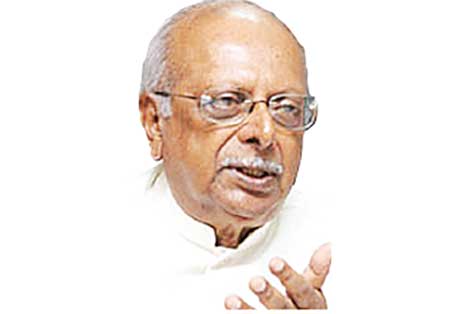
The Covid-19 pandemic continues to spread at an alarming rate in Sri Lanka and in most countries world-wide. This is mainly due to the lack of a people-based campaign with proper leadership. In Sri Lanka the corona virus was introduced into the country by identified individuals coming from abroad. By identifying each case and the contacts who formed a cluster and isolating each cluster for the required period, the spread to the community was prevented.
This was done effectively by Sri Lanka’s good Public Health Service well supported by the Armed Forces. But with a high percentage of those infected not showing any symptoms (maybe as much as 80%), the virus began to spread among the community.
But that stage is well passed and today there is extensive spread among the community island- wide. Community spread began in the Western province with Colombo as the focus. Had there been early recognition of this change, a campaign to create awareness among the public and effective action to perform effective crowd control measures, the spread could have been controlled to a considerable extent. For some strange reason, this was not publicly accepted, as if a natural epidemiological effect was a sign of failure, and the campaign was continued on the basis of the cluster concept.
The Health Service backed by the Police and Armed Services is bearing the brunt of the present campaign. Fever cases are being tested with the PCR and RAT and positives are being hospitalized. Due to shortage of hospital beds, some milder patients are being isolated in their homes. Other public health measures are being implemented. But the epidemic is spreading fast. This is not surprising with the large number of asymptomatic infections in the community. This calls for a community based approach which is carried out nationally. We have a multicultural society and the practices of each community should be accommodated in the campaign.
My first suggestion was that all political leaders be brought into a Covid control committee so that it becomes a National Campaign. This Committee should interact with the Minister of Health both within and outside Parliament in a supportive manner. The most important step is to ensure that the whole community, every household is involved and made fully aware. Intense health education using all media would achieve this in a week or two, from children right up to the elderly. The core message should be that one has to presume that everyone in society is infected, and that for one’s own protection, the three health practices must be carried out: wearing a face mask properly at all times, especially when one goes outside the home, and even at home when any outsiders come in, practice social distancing (two meters is better), and frequent hand washing, especially when touching any object that someone else may have touched.
Avoid crowd gathering. This should be practiced by everyone, with political and social leaders setting the example. The reaction of people in the country should be that if anyone is seen to break the rules, others should point this out to him at once. This practice should prevail in town and village, at home and workplace. Sharing of towels, handkerchiefs, pillows, sheets etc. should stop. Everyone should carry one’s own small hand towel in the pocket or handbag.
A Covid Committee should be established in every village, at street level in every town, and in all workplaces. Besides its preventive role, it must help the family of an infected person, e.g. supply food and other needs, and give moral support. The Committee must ensure that the contacts do not infect anyone else. If any person develops any possible symptoms, the patient should be shown to a doctor at once. The Covid Committee should have a health official like a PHI or Midwife to be in contact.
The Committee should ensure that people do not crowd together. All social and political meetings should not be allowed. Essential meetings should be confined to the smallest number of essential people, who must observe the health guidelines. At the entry and exit to all public places, soap and water with washing facilities must be provided and their use made compulsory. If possible hand washing facilities with 80% alcohol sprays could be provided.
All Government officials, especially the Police, should prevent people crowding together e.g. at shops, bus stands and buses etc.. They should ensure that the three health practices are observed. Stern action should be taken against violators.
The Covid 19 virus is new to the world and there is no herd immunity. We have much through research to learn about it so that we can better control its spread and treat it. The Coronavirus that causes Covid-19 is fairly large (80 to 160mm) and generally multiplies in the human respiratory tract cells. As other coronaviruses can enter our body through the mouth and then multiply in the bowel, this is a theoretical possibility, but any indications to that occurring have not been established to my knowledge. It is generally transferred from an infected person to another person from the nose, mouth and possibly from the eyes through sneezing (nasal secretions) coughing (saliva and respiratory secretions) and tears.
Recent mention has been made of a new variant that can be airborne i.e. be carried by air (currents) just as virus particles. If true, this means that the masks should be able to block the small virus particles, and the social distance rule needs to be further lengthened. But as a single or a few virus particle are unlikely to transfer the infection, we can let events justify the need to take these extreme steps.
As is well known viruses multiply and grow only in specific living cells, in this case those of our respiratory tract. If they fall elsewhere, in a matter of hours they die. Therefore, let us focus on practicing our health rules. But everyone must do this as a habit. In this way, we can protect ourselves and at the same time, protect everyone else. If everybody does this the virus will die out.
Much effort and money is being spent on obtaining vaccines to protect our people. But it usually takes several years, about seven years on an average, before the ideal vaccine that is safe and effective, is developed. What is being offered may or may not work, or be safe considering the short period.
The duration of protection is unknown. It may need to be repeated in a year or two. Even the best vaccine only protects that particular individual (as this is not a live virus). To protect everybody, it must be given to each and every one. Then only will transmission stops. With luck, it may stop with about 80% coverage. Vaccinating those who run the risk of dying (vulnerable people) like the elderly and those with heart and lung disease or debilitating conditions like diabetes, is to be recommended. Those who are exposed to repeated infection like doctors and nurses should be covered. Taking our financial situation as a country and the outcomes, limiting vaccination to vulnerable groups is more sensible.
Prof. Tissa Vitarana
News
Three arrested with narcotics valued at Rs123 million at BIA
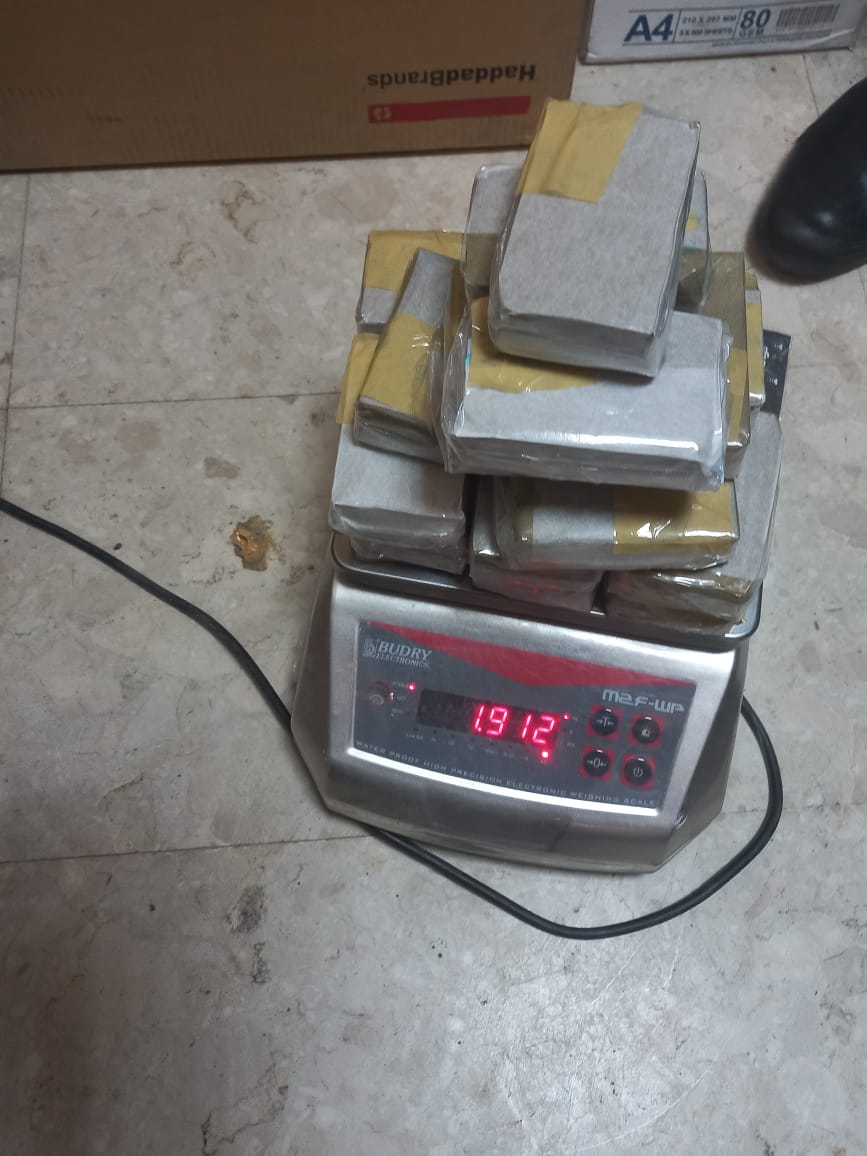
Three Sri Lankan male passengers who arrived from Muscat by flight no. OV 437 on Saturday (24) have been arrested by officers attached to the NCU at BIA as they were found to be carrying 12,306 grams of Cannabis class narcotics (suspected as Hashish & Kush) valued at 123 million rupees.
Latest News
Navy intercepts 02 narcotics-laden trawlers with 11 suspects in southern seas
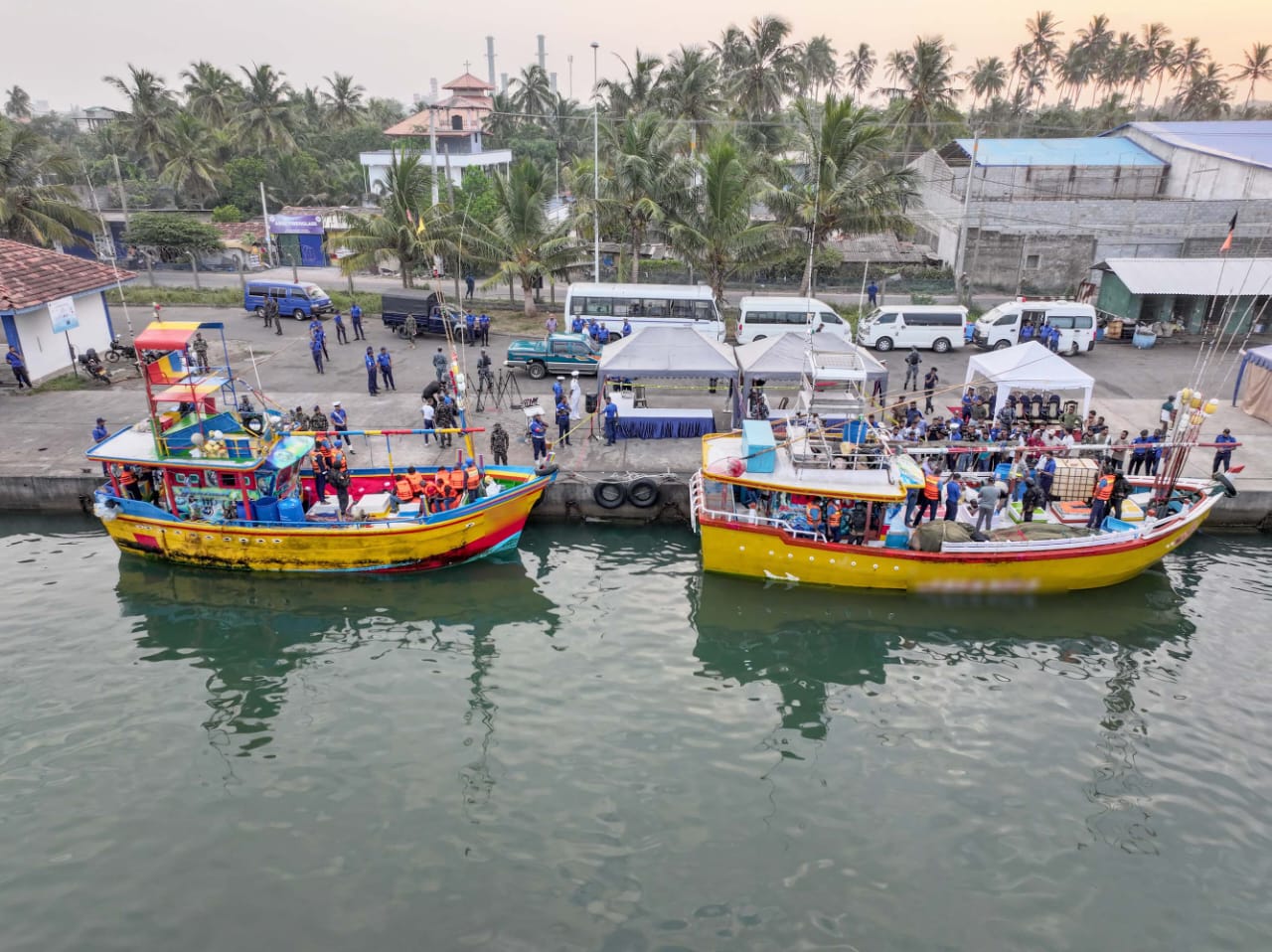
Building on its success in seizing major narcotic stocks in 2025, the Navy continued to support the “A Nation United” National Mission in 2026. In continuation of these efforts, during an
operation conducted on the high seas south of Sri Lanka, the Navy apprehended eleven (11) suspects aboard two local multi-day fishing trawlers suspected of drug smuggling.
Based on shared information, by the Sri Lanka Navy and Police, this special operation was conducted off the southern coast, deploying the Navy‟s Offshore Patrol Vessels. The operation
resulted in the interception of a multi-day fishing trawler suspected of smuggling narcotics, and the apprehension of five (05) suspects on board.
During further operations in the same area, naval units seized another multi-day fishing trawler (01), along with communication equipment and six (06) additional suspects, also believed to be involved in drug smuggling.
This morning (25 Jan 26), the two intercepted fishing trawlers, along with fourteen (14) sacks laden with suspected narcotics and the suspects, were brought to the Dikovita Fisheries Harbour.
An expert examination by the Police Narcotic Bureau confirmed that the fourteen (14) sacks contained more than 184 kilograms of heroin and over 112 kilograms of ‘Ice’ (crystal methamphetamine).
The Deputy Minister of Defence, Major General (Retd) Aruna Jayasekara, the Commander of the Navy, Vice Admiral Kanchana Banagoda, and the Inspector General of Police, Priyantha Weerasuriya, inspected the narcotics at the Dikovita harbour.
The Deputy Minister of Defence said that the current administration has initiated several projects for national development. As a flagship initiative, under the directives and guidance of the President, and under the supervision of the
Ministry of Defence, well-coordinated anti-narcotic raids have been launched.
This effort, part of “A Nation United” National Mission, involves the tri-forces, police, and all intelligence agencies working together under a coordinated plan to ensure that drug smugglers have no opportunity to bring narcotics into the country, he opined. He further stated that despite the national disaster situation, the state machinery, including the tri-forces, the police, and the public at large, remains united in rebuilding the nation, no room will be left for drug trafficking, which poses a severe threat to national security and public safety. Those
who engage in or support drug trafficking, under the cover of fishing activities, will find no escape, he added.
The Deputy Minister also reaffirmed that the tri-forces, police, and all law enforcement agencies are fully committed to their duty of suppressing this menace.
The Deputy Minister of Defence reported that, throughout 2025, a series of highly successful operations were conducted leading to numerous arrests. This was achieved through close coordination and mutual cooperation among the tri-services, the police, the Special Task Force, Police Narcotics Bureau, local law enforcement and international agencies. He noted that this
same spirit of cooperation and commitment has continued into 2026, resulting in the seizure of a large stockpile of drugs.
On behalf of the Honourable President, he extended gratitude to all who contributed to these efforts, specifically acknowledging the Commander of the Navy, the Inspector General of Police, the Police Narcotic Bureau, and the crews of the Navy’s Offshore
Patrol Vessels.
Moreover, the Deputy Minister declared that drug smuggling has become a national crisis, fueled by youth involvement and social crime. With borders secured under the “Nation United” National Mission, he warned traffickers to cease operations and urged users to abandon the destructive habit.
The Deputy Minister urged the public to report suspected drug smugglers to law enforcement via the hotlines 1818 or 1997 and also commended the role of media institutions and journalists in raising public awareness about the dangers of narcotics through responsible reporting.
Meanwhile, the two (02) multi-day fishing trawlers, along with a haul of narcotics, eleven (11) suspects, and communication equipment, were handed over to the Police Narcotic Bureau for
further investigation and legal proceedings.
News
Engineers draw red line as CEBEU warns of union action over appointed date
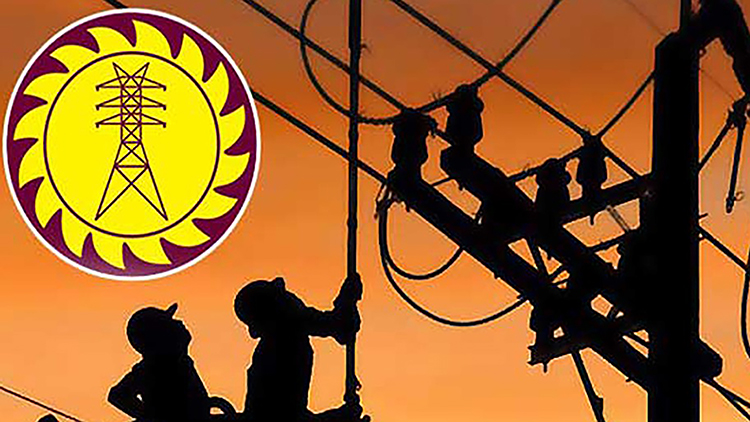
Engineers at the Ceylon Electricity Board have drawn a clear red line over the government’s plan to gazette the appointed date for restructuring the utility, warning that trade union action will follow if the move is pushed through without addressing their core demands, the Sunday Island learns.
The powerful Ceylon Electricity Board Engineers’ Union (CEBEU) says preparations are already under way for industrial action, most likely after the appointed date gazette is published, should the Minister proceed without resolving outstanding issues raised repeatedly by engineers.
“If the appointed date is gazetted without addressing our demands, we will have no option but to take trade union action,” a senior electrical engineer told The Island, stressing that the warning should be taken seriously.
CEBEU sources say the engineers’ demands are aimed at preventing a structural and financial crisis in the electricity sector, rather than blocking reform. They insist that unbundling the CEB without first putting in place firm safeguards would expose the sector to instability and consumers to higher costs.
The engineers’ key demands include: legally binding financial safeguards to ensure the proposed Electricity Generation Company is viable from inception; protection against the transfer of legacy liabilities, extraordinary costs, or inefficiencies to new entities or electricity consumers; enforceable accountability for management and policy decisions that inflate system costs; genuine, structured consultation with technical professionals before irreversible decisions are taken; and a halt to gazetting the appointed date until these safeguards are formally incorporated.
Engineers warn that rushing the appointed date would lock existing weaknesses into the new structure, making them harder—and more expensive—to fix later. “Once the appointed date is gazetted, there is no rewind button,” a senior engineer said. “If the foundation is flawed, the entire structure will suffer.”
Meanwhile, according to energy analyst, Dr. Vidhura Ralapanwe, electricity sector reforms must be grounded in technical and financial reality, not driven by administrative timelines.
He has cautioned that implementing structural changes without correcting underlying governance and cost issues risks destabilising the sector and undermining public confidence.
CEBEU officials reject claims that the union is resisting reform. They say engineers are being sidelined in decision-making while being held responsible for system performance. “We are accountable for keeping the system running, but our professional warnings are being ignored,” one engineer said. “That is not reform; it is reckless governance.”
With the Minister yet to gazette the appointed date, tensions within the power sector are rising sharply.
Engineers say the government now faces a stark choice: engage with professionals and fix the problems first—or brace for confrontation in a sector where disruption will have coutrywide consequences.
By Ifham Nizam ✍️
-

 Features7 days ago
Features7 days agoExtended mind thesis:A Buddhist perspective
-
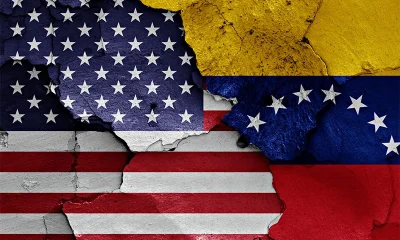
 Opinion6 days ago
Opinion6 days agoAmerican rulers’ hatred for Venezuela and its leaders
-

 Business14 hours ago
Business14 hours agoComBank advances ForwardTogether agenda with event on sustainable business transformation
-

 Business4 days ago
Business4 days agoCORALL Conservation Trust Fund – a historic first for SL
-
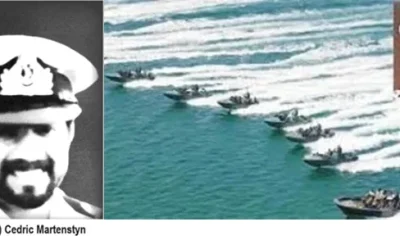
 Opinion4 days ago
Opinion4 days agoRemembering Cedric, who helped neutralise LTTE terrorism
-
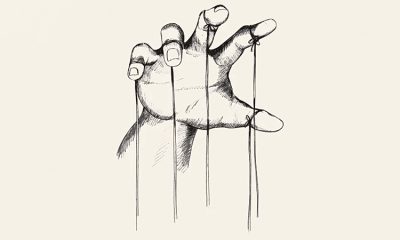
 Opinion3 days ago
Opinion3 days agoA puppet show?
-
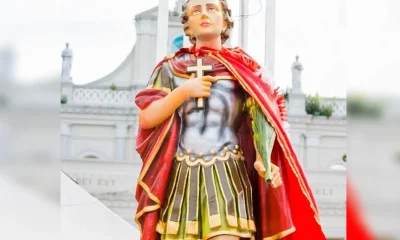
 Opinion6 days ago
Opinion6 days agoHistory of St. Sebastian’s National Shrine Kandana
-

 Features5 days ago
Features5 days agoThe middle-class money trap: Why looking rich keeps Sri Lankans poor













